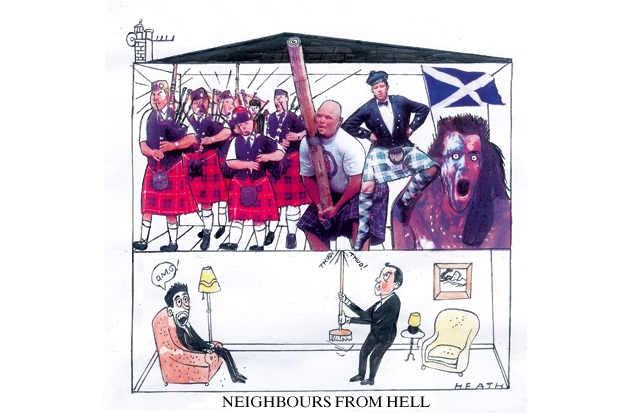Home
England suddenly began to take the prospect of Scottish independence seriously after a poll of 1,084 people by YouGov put support for it at 51 per cent and opposition at 49 per cent. A survey by TNS showed 38 per cent of Scots backed independence compared to 39 per cent opposing it (with 23 per cent not knowing). The pound fell to its lowest for ten months against the dollar. George Osborne, the Chancellor of the Exchequer, in concert with Labour and the Liberal Democrats, promised a timetable for further devolution if voters in Scotland would only reject independence. The Prime Minister and the leader of the opposition agreed to cancel Prime Minister’s Questions and fly to Scotland, in the apparent belief that it would help. Nick Clegg, the Deputy Prime Minister, went too. Buckingham Palace said: ‘Any suggestion that the Queen would wish to influence the outcome of the current referendum campaign is categorically wrong.’ Mark Carney, the Governor of the Bank of England, in answer to a question, said that ‘a currency union is incompatible with sovereignty’. Those inside No. 10 Downing Street thought it would be good to hoist St Andrew’s saltire on its flagpole; at the first attempt it fell down.
MPs should receive a 9 per cent pay rise, taking their basic salary to £74,000, according to Marcial Boo, the chief executive of the Independent Parliamentary Standards Authority. George Osborne ruled that rail fares should rise by only 2.5 per cent, instead of the 3.5 per cent planned. A report commissioned by the Post Office found that some sub-postmasters had been accused of theft because of badly functioning computer systems; one lost her life savings repaying an incorrect shortfall. Middlesbrough is to build a short swing bridge to the entrance to Middlehaven Dock for £4.5 million. Archaeologists scanning 3,000 acres around Stonehenge traced remains of 17 other monuments.
Ashya King, a boy aged five suffering from brain cancer, whose parents were held in jail for two nights in Madrid after they took him from a hospital in Southampton, was allowed to be taken for treatment in Prague. The London Fire Brigade said it had been called to rescue people trapped in a lift at Earlsdown House, Barking, 22 times. The Duchess of Cambridge is expecting a second child.
Abroad
Haider al-Abadi, the prime minister of Iraq, formed a government with posts shared between Shia and Sunni Arabs and Kurds. America called it a milestone. President Barack Obama met Congressional leaders to tell them he had authority to act without their further approval in a military campaign against Islamic State forces in Iraq and Syria. Britain sent 40 machine guns and half a million rounds of ammunition to Iraq at the request of its government, including the Kurdish regional government. In an effort to stop migrants climbing into lorries and ferries bound for England, Britain offered to send to Calais 12 miles of 9ft steel fencing that had been used at the Nato summit in Monmouthshire. Portfolios for the 28 European commissioners were shared out. An elephant in a home for elephants in Maine accidentally killed its handler. Avian malaria was said to be putting in danger all 33 species of endemic Hawaiian birds.
Ukraine and pro-Russian rebels in the east signed a truce, but shelling continued at Mariupol and near Donetsk airport. France had earlier decided to suspend delivery of a Mistral naval assault ship to Russia. Dutch experts found that Malaysia Airlines flight MH17, which crashed in Ukraine in July, had been hit by objects that ‘pierced the plane at high velocity’, which was consistent with an exploding missile. Hundreds of Indians and Pakistanis died in flooding in Kashmir. One of the two ships in Sir John Franklin’s expedition to chart the Northwest Passage in 1845 was found on the sea floor of Victoria Strait, off King William Island in Canada.
Ebola fever has killed 2,288 people in west Africa, with half of those dying in the last three weeks, according to the World Health Organisation. Ayatollah Ali Khamenei, the Supreme Leader of Iran, had surgery for prostate cancer. Joan Rivers, the comedian, died, aged 81. Apple put on sale an iPhone with a larger screen and a watch that tells you if your heart is still beating. Pakistan’s Saeed Ajmal was suspended by the International Cricket Council for bowling with his arm bent by more than 15 degrees. People near Managua airport in Nicaragua reported a loud bang during the night when a meteorite landed, leaving a crater 40ft wide. CSH






Comments